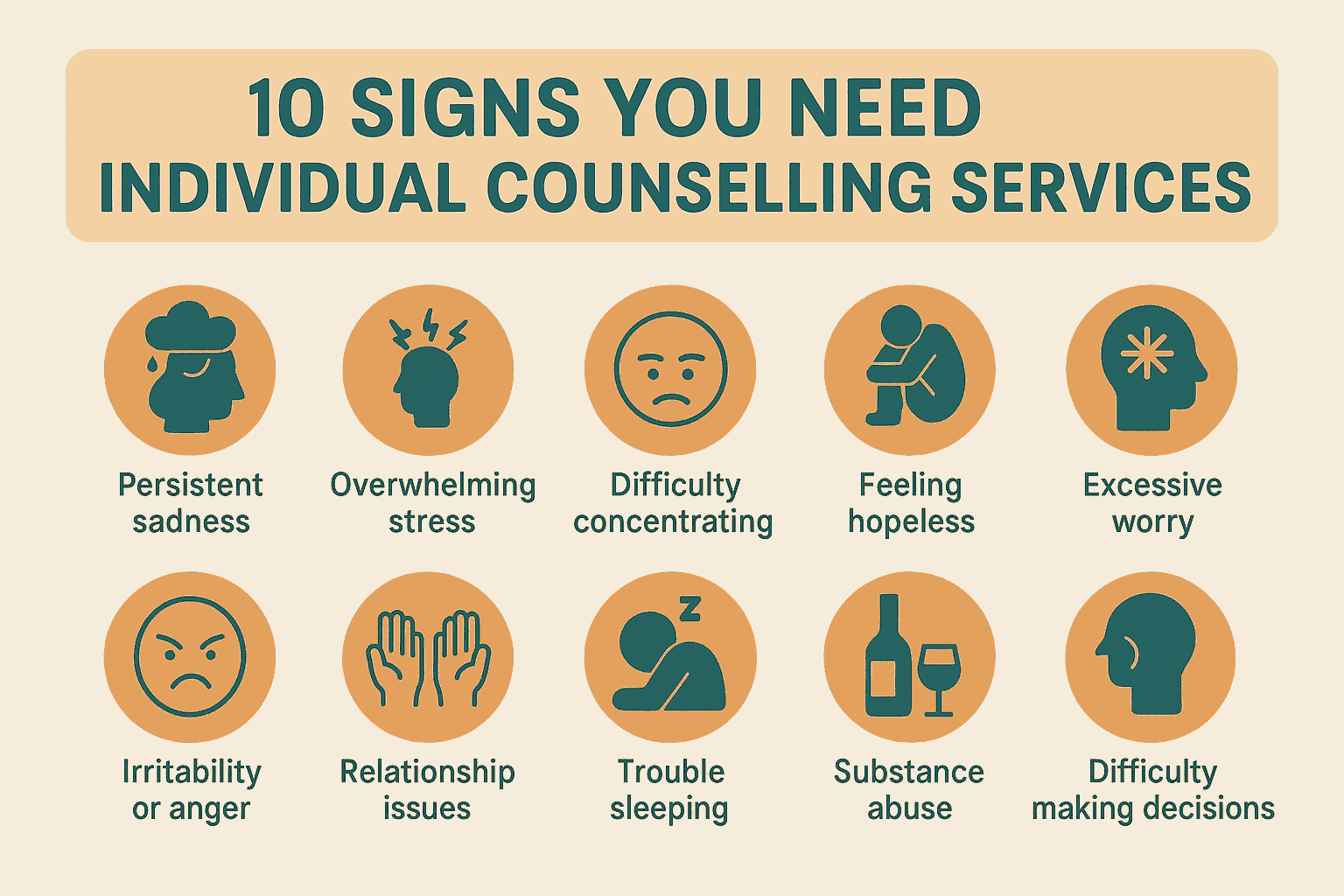From anxiety to empowerment: how Individual Counselling Toronto creates lasting change
Wiki Article
Discovering the Benefits of Psychological Treatment for Adolescent Health and Development
Psychological therapy plays a crucial function in the well-being and growth of teens. Adolescence is a turbulent duration noted by emotional and social challenges. Treatment offers a structured setting for teenagers to express their feelings and confront their struggles. It outfits them with crucial devices for strength and interaction. As they browse this developmental phase, the influence of treatment can be extensive. What specific advantages can emerge from such assistance throughout these formative years?
Comprehending the Teen Mind: Challenges and Pressures
As teenagers navigate the intricacies of their developmental phase, they face many challenges and pressures that can significantly impact their psychological health. This period is marked by significant physical, psychological, and social changes, which can cause feelings of confusion and unpredictability. Peer impact intensifies, typically leading to a battle for acceptance and identification. Academic expectations can produce added tension, as the pressure to stand out installs in a progressively affordable atmosphere.The development of social media presents a brand-new layer of intricacy, where contrasts to curated online identities can aggravate sensations of insufficiency and anxiousness. These aspects can bring about psychological distress, including anxiety, clinical depression, and low self-esteem. Recognizing these obstacles is crucial for parents, teachers, and mental health specialists, as it gives insight into the teen experience and highlights the demand for supportive interventions to cultivate resilience and health throughout this vital developmental phase.
Producing a Safe Room for Expression
Creating a safe room for expression is essential for teens steering their turbulent developing phase. In healing settings, this setting cultivates open discussion, permitting teens to connect their sensations without worry of judgment. Such spaces enable them to discover their feelings and ideas, which is necessary for comprehending their identities and experiences.When adolescents feel protected, they are more most likely to share their battles, including stress and anxiety, depression, or social disputes. This open communication can lead to much deeper understandings and facilitate personal growth.
Furthermore, a safe space urges creative thinking and self-reflection, providing teenagers the flexibility to reveal themselves through numerous electrical outlets, such as art or writing. Establishing trust fund in between the therapist and the adolescent is essential, as it underpins the efficiency of the restorative procedure. Eventually, creating a risk-free space for expression acts as a structure for psychological recovery and individual advancement during these formative years.
Establishing Coping Techniques and Strength

Specialists commonly present techniques such as mindfulness, journaling, and problem-solving abilities, enabling teens to handle their reactions better. Additionally, by engaging in role-play circumstances, they exercise exactly how to manage tight spots, enhancing their confidence. Over time, these skills promote a feeling of company, equipping teenagers with the devices to navigate life's unpredictabilities. The growth of strength not only aids in getting rid of immediate obstacles yet likewise lays the foundation for healthier psychological feedbacks in the adult years, inevitably adding to lifelong health.
Enhancing Interaction Skills
Effective communication skills are essential for teenagers as they navigate complicated social landscapes. Psychological treatment plays a vital function in boosting these abilities, permitting adolescents to reveal their emotions and thoughts much more plainly. Via assisted sessions, specialists urge teens to verbalize their feelings, facilitating much better understanding in peer interactions and family dynamics.Therapy provides a secure area for practicing active listening, compassion, and assertiveness. These skills empower young adults to take part in purposeful conversations, willpower conflicts, and develop stronger partnerships. As they discover to interact efficiently, they likewise acquire self-confidence in their capacity to support on their own and their needs.
In addition, improved communication abilities contribute to emotional knowledge, allowing teenagers to respond and acknowledge to the emotions of others. This holistic growth promotes a helpful atmosphere, eventually promoting general health and social combination. With mental treatment, young adults can cultivate these crucial abilities for a healthier social experience.
Fostering Individual Development and Self-Discovery
Promoting individual development and self-discovery in teens entails a diverse technique that encourages understanding of individuality. This procedure likewise highlights the relevance of building durability skills and improving emotional recognition. With each other, these components create a structure for much healthier, a lot more positive people as they browse their formative years.Recognizing Individuality
Just how do young adults navigate the complicated landscape of individual identification as they venture for self-discovery and development? Throughout this formative period, they come to grips with numerous influences, consisting of peers, family members, and social assumptions. Mental therapy can serve as a necessary device, providing a secure space for expedition and representation. Through guided conversations, young adults can articulate their feelings and thoughts, permitting them to recognize their beliefs, values, and needs. This process cultivates a much deeper awareness of their one-of-a-kind identity, equipping them to make informed options and develop a feeling of purpose. As they involve in self-discovery, they find out to accept their uniqueness and navigate challenges with better clearness, ultimately improving their overall well-being and personal growth.Structure Resilience Abilities

Enhancing Emotional Recognition
Enhancing emotional recognition is vital for young adults maneuvering the complexities of adolescence, as it allows them to recognize and recognize their sensations extra efficiently. By involving in psychological treatment, teenagers find out to identify their emotional feedbacks and the triggers behind them. This process promotes individual growth and self-discovery, enabling them to express their feelings and manage obstacles extra adeptly. As teens create psychological understanding, they grow compassion, improve relationships, and enhance communication abilities. In addition, this enhanced awareness help in decision-making, aiding them navigate social stress and establish a feeling of identification. Eventually, fostering psychological recognition with treatment can bring about much healthier coping mechanisms and an extra balanced mood, fundamental for prospering during these formative years.Structure Healthy Relationships and Support Equipments
While traversing the intricacies of adolescence, developing healthy connections and support systems is necessary for teens. These links provide emotional security and a sense of belonging, important throughout this developing stage. Favorable relationships with peers, family members, and advisors can improve self-esteem and resilience, making it possible for teenagers to browse difficulties better.Psychological treatment plays a crucial role in promoting these partnerships by equipping teenagers with interaction and conflict-resolution skills. Via treatment, they find out to share their feelings, recognize different viewpoints, and establish limits, which are essential for keeping healthy and balanced communications.
In addition, encouraging networks encourage young adults to seek help when required, minimizing isolation and advertising psychological health. When teens feel linked to their support group, they are more probable to take part in useful habits and make informed choices. Generally, the farming of healthy and balanced relationships and support group contributes in promoting adolescent health and personal development
Often Asked Concerns
Just how Do I Discover a Competent Therapist for My Teenager?
To discover a qualified therapist for a teen, one need to look for referrals from doctor, study qualifications on-line, examine evaluations, and establish the specialist concentrates on adolescent concerns, fostering an encouraging setting for growth.What Are the Costs Related To Mental Treatment for Teens?
The prices connected with mental treatment for teenagers differ commonly, commonly ranging from $50 to $250 per session. Insurance policy coverage, moving range charges, and local sources can influence price and ease of access for families looking for assistance.
Just How Typically Should Teenagers Go To Therapy Procedure?
Teens ought to ideally participate in therapy sessions weekly or biweekly, depending on individual needs. Constant sessions can foster a safe space for expression, while allowing therapists to check progress and change techniques efficiently over time.Can Treatment Be Efficient for All Teenagers?
Therapy can be reliable for several teenagers, yet specific outcomes differ. Variables such as personal situations, visibility to the process, and the restorative method utilized all affect its efficiency for each adolescent.What Should Moms and dads Do Throughout Their Teen's Treatment Refine?
Parents must actively support their young adult's treatment process by preserving open communication, appreciating privacy, participating in sessions if invited, and Individual Counselling Services urging their child's initiatives (Individual Therapy For Teens). Comprehending and perseverance are important as teens browse their personal development journeyPsychological treatment plays a pivotal role in the well-being and development of young adults. By involving in psychological treatment, teenagers find out to acknowledge their emotional responses and the triggers behind them. Psychological therapy plays a pivotal function in cultivating these relationships by gearing up adolescents with interaction and conflict-resolution abilities. Teens should preferably attend treatment sessions regular or biweekly, depending on specific needs. Parents need to proactively sustain their teenager's treatment procedure by maintaining open interaction, appreciating privacy, attending sessions if welcomed, and urging their child's efforts.
Report this wiki page